|
|
|
Sort Order |
|
|
|
Items / Page
|
|
|
|
|
|
|
| Srl | Item |
| 1 |
ID:
105249
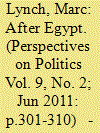

|
|
|
|
|
| Publication |
2011.
|
| Summary/Abstract |
The uprisings which swept across the Arab world beginning in December 2010 pose a serious challenge to many of the core findings of the political science literature focused on the durability of the authoritarian Middle Eastern state. The impact of social media on contentious politics represents one of the many areas which will require significant new thinking. The dramatic change in the information environment over the last decade has changed individual competencies, the ability to organize for collective action, and the transmission of information from the local to the international level. It has also strengthened some of the core competencies of authoritarian states even as it has undermined others. The long term evolution of a new kind of public sphere may matter more than immediate political outcomes, however. Rigorous testing of competing hypotheses about the impact of the new social media will require not only conceptual development but also the use of new kinds of data analysis not traditionally adopted in Middle East area studies.
|
|
|
|
|
|
|
|
|
|
|
|
|
|
|
|
| 2 |
ID:
105250
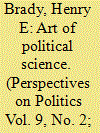

|
|
|
|
|
| Publication |
2011.
|
| Summary/Abstract |
Spatial diagrams of politics could and should be iconic for political science in much the same way as supply-and-demand curves are in economics. Many fundamental problems of political science can be connected with them, and many different concepts-such as ideological constraint, cross-pressures, framing, agenda-setting, political competition, voting systems, and party systems, to name just a few-can be illuminated through spatial diagrams. Spatial diagrams raise questions and provide insights. They suggest political maneuvers, possible realignments, and political problems. They provide us with revealing images that aid memory and facilitate analysis. They are a powerful way to think about politics, and we could not do better than to feature them in our textbooks, to use them in our research, and to exhibit them as our brand-as our distinctive way of thinking about how the world works
|
|
|
|
|
|
|
|
|
|
|
|
|
|
|
|
| 3 |
ID:
105246
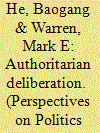

|
|
|
|
|
| Publication |
2011.
|
| Summary/Abstract |
Authoritarian rule in China is now permeated by a wide variety of deliberative practices. These practices combine authoritarian concentrations of power with deliberative influence, producing the apparent anomaly of authoritarian deliberation. Although deliberation is usually associated with democracy, they are distinct phenomena. Democracy involves the inclusion of individuals in matters that affect them through distributions of empowerments such as votes and rights. Deliberation is a mode of communication involving persuasion-based influence. Combinations of non-inclusive power and deliberative influence-authoritarian deliberation-are readily identifiable in China, probably reflecting failures of command authoritarianism under the conditions of complexity and pluralism produced by market-oriented development. The concept of authoritarian deliberation frames two possible trajectories of political development in China: the increasing use of deliberative practices stabilizes and strengthens authoritarian rule, or deliberative practices serve as a leading edge of democratization.
|
|
|
|
|
|
|
|
|
|
|
|
|
|
|
|
| 4 |
ID:
105243
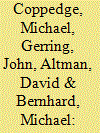

|
|
|
|
|
| Publication |
2011.
|
| Summary/Abstract |
In the wake of the Cold War, democracy has gained the status of a mantra. Yet there is no consensus about how to conceptualize and measure regimes such that meaningful comparisons can be made through time and across countries. In this prescriptive article, we argue for a new approach to conceptualization and measurement. We first review some of the weaknesses among traditional approaches. We then lay out our approach, which may be characterized as historical, multidimensional, disaggregated, and transparent. We end by reviewing some of the payoffs such an approach might bring to the study of democracy.
|
|
|
|
|
|
|
|
|
|
|
|
|
|
|
|
| 5 |
ID:
105252
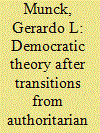

|
|
|
|
|
| Publication |
2011.
|
| Summary/Abstract |
Recent events across the globe make clear the complexities of the politics of "democratization" and the importance of developing nuanced and compelling understandings of these complexities. In Eurasia, "Color Revolutions" have given way to democratic disappointments and "authoritarian regimes." In north Africa, an unanticipated upsurge of democratic movements has felled autocrats in Tunisia and Egypt, but the political outcomes of these "transitions" are very much in doubt. Contemporary political science has developed an elaborate vocabulary for understanding such processes. And this vocabulary owes a great deal to a small group of scholars-Juan Linz, Guillermo O'Donnell, Philippe Schmitter, Alfred Stepan and Adam Przeworksi-who helped to lay the theoretical foundations of our current understanding of politics around the globe.
|
|
|
|
|
|
|
|
|
|
|
|
|
|
|
|
| 6 |
ID:
105248


|
|
|
|
|
| Publication |
2011.
|
| Summary/Abstract |
Mechanical metaphors have colonized the social sciences, including the study of democratization processes. But they may provide a misleading framework for monitoring ongoing "self-equilibrating" social processes with no natural "end state" such as democratization. I propose that modern biology can be consulted as an alternative source of analogical reasoning, offering a more flexible and appropriate stock of metaphors that can enliven analogical accounts of processes of democratization. The shift towards modeling democracy as a living practice permanently directed towards self-preservation and propagation provides a clearer rationale for comparative studies, focussing on the relative "quality" of democracy in different contexts. I begin with a brief sketch of the historical instability and current contestability of most democratization processes; I then examine the morphology of complex political concepts and propose alternative biological analogies to replace the currently prevalent physicalist imagery.
|
|
|
|
|
|
|
|
|
|
|
|
|
|
|
|
| 7 |
ID:
105258


|
|
|
| 8 |
ID:
105254
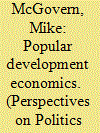

|
|
|
|
|
| Publication |
2011.
|
| Summary/Abstract |
In 1997, I found myself newly arrived at Oxford University. I was taking a detour from my path to do research in West Africa thanks to a fellowship that funded a year of ancillary training before my fieldwork. Though studying anthropology, I was at St. Antony's College, where Paul Collier's Center for the Study of African Economies is located, and was in the same entering cohort as Collier's now-famous student Dambisa Moyo (assuming I would not be able to remember her first name, she offered, "it sounds kind of like 'pizza'").
|
|
|
|
|
|
|
|
|
|
|
|
|
|
|
|
|
|
|
|
|